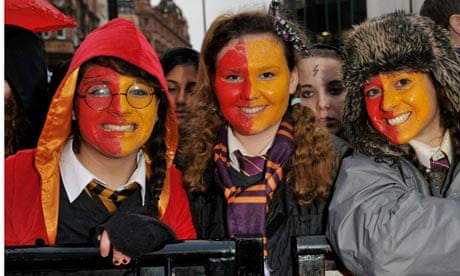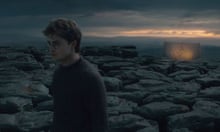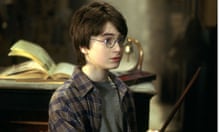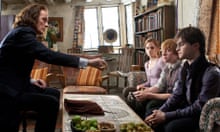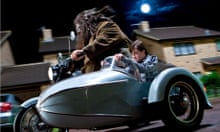When the film of Harry Potter and the Philosopher's Stone was released on 4 November 2001, I was 11 and in my final year of primary school. A cinema trip had been organised by our English teacher for the following day. I remember painting my nails in honour of the occasion, then anxiously watching the clock in the nurse's office where I was made to sit with a bottle of nail varnish remover and some cotton wool until the offending Gryffindor red had been adequately erased from my cuticles, terrified that the coach might leave without me.
Nine years later, I find myself again nervously glancing at my watch on Friday night as I make my way towards the Leicester Square Odeon in London. The film is not due to start until 6.30, but at 5.15 there is already a considerable queue forming in the rain. There are plenty of excited children, accompanied by irritable parents, but plenty of people my age too. We're the ones determinedly not talking about the film, except to make the odd disparaging comment about Emma Watson's new haircut or Daniel Radcliffe's new shoulders (which we decide are entirely too large and muscled to belong to the wiry "Chosen One".)
We roll our eyes at the chattering kids in wizard hats and make vague plans to go to the pub afterwards because we are now 20-year-olds and, as a matter of principle, really should spend Friday night in Wetherspoons and Saturday morning feeling sick.
What we do not want to admit is that we are horribly protective of the Harry Potter series. We tut and glare at the children who squeal at Nagini (Lord Voldemort's serpentine version of the white fluffy cat carried by Muggle supervillains) yet when Hermione utters a spell to remove herself from her parents' memories, or later when Dobby the House Elf makes his final heroic attempt to "save Harry Potter and his friends", we are totally silent. Not because the acting is awe-inspiring but because these are our characters, our films, based on the books and the craze that swept our generation.
Eleven-year-olds picking up the first Harry Potter book now will never understand the anticipation and yearning we felt as we waited three years for the release of the next instalment, or the sight of a silent playing field at school the next day when 300 children and most of the teachers spent lunch break hunched over their new hardback copies. They will read the books and picture Daniel, Emma and Rupert in their minds' eyes, while we shake our heads, knowing full well that Hermione isn't meant to be "fit" (at least not until the Yule Ball in Goblet of Fire) and there is much more to Ronald Weasley than arachnophobia and a comically British way of shouting "bloody hell!" When the latest film deviates from canon and Harry and Hermione share an all-too-romantic dance in their tent, the unruffled nine- and 10-year-olds don't bat an eyelid, while the cinema is filled with the outraged hisses of the young adult audience: "That is just wrong." Everybody knows Harry and Hermione are simply friends, just like everybody knows that the Weasleys' house did not burn down in the sixth book.
To say we "grew up" with Harry, Ron and Hermione might be cliched, but you'd be hard pushed to find an 18-, 19- or 20-year-old who did not feel a certain sense of shame knowing that when, at 13, they lit their first cigarette in a park after school, the corresponding character doing the same in Potterland was the repulsive Dudley Dursley. At the age of 11 it was comforting to know that untameable frizzy hair, teeth that needed a good spell of orthodontic magic and an irritating tendency to shout out the right answer at school didn't make me a freak; it made me a Hermione.
The Potter films were never going to live up to the books, simply because it would be impossible to please an audience for whom the series is so deeply personal. It is unnerving to see the visual proof in the now mature cast that we have, sadly, grown up, and will probably watch Deathly Hallows Part One with our uni friends, not our English teachers, and follow it up with a pub trip, not Pizza Express. There is a "goodbye, childhood" feel to the latest film, aided by the fact that Hogwarts itself is left behind while Harry pursues Voldemort for the final time. At least defeating the Dark Lord will look good on his Ucas application.
